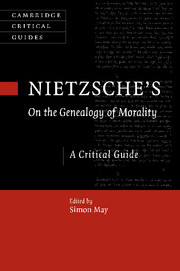Book contents
- Frontmatter
- Contents
- Contributors
- Acknowledgements
- Note on texts, translations, and references
- Introduction
- Chapter 1 The future of evil
- Chapter 2 On the nobility of Nietzsche’s priests
- Chapter 3 The genealogy of guilt
- Chapter 4 Why Nietzsche is still in the morality game
- Chapter 5 Who is the “sovereign individual”? Nietzsche on freedom
- Chapter 6 Ressentiment and morality
- Chapter 7 The role of life in the Genealogy
- Chapter 8 The relevance of history for moral philosophy
- Chapter 9 Why would master morality surrender its power?
- Chapter 10 “Genealogy” and the Genealogy
- Chapter 11 The promising animal
- Chapter 12 Nietzsche and the “aesthetics of character”
- Chapter 13 Nietzsche and the virtues of mature egoism
- Chapter 14 Une promesse de bonheur? Beauty in the Genealogy
- Bibliography
- Index
Chapter 1 - The future of evil
Published online by Cambridge University Press: 05 November 2011
- Frontmatter
- Contents
- Contributors
- Acknowledgements
- Note on texts, translations, and references
- Introduction
- Chapter 1 The future of evil
- Chapter 2 On the nobility of Nietzsche’s priests
- Chapter 3 The genealogy of guilt
- Chapter 4 Why Nietzsche is still in the morality game
- Chapter 5 Who is the “sovereign individual”? Nietzsche on freedom
- Chapter 6 Ressentiment and morality
- Chapter 7 The role of life in the Genealogy
- Chapter 8 The relevance of history for moral philosophy
- Chapter 9 Why would master morality surrender its power?
- Chapter 10 “Genealogy” and the Genealogy
- Chapter 11 The promising animal
- Chapter 12 Nietzsche and the “aesthetics of character”
- Chapter 13 Nietzsche and the virtues of mature egoism
- Chapter 14 Une promesse de bonheur? Beauty in the Genealogy
- Bibliography
- Index
Summary
There are fashions as much in vices as in virtues, and these are neither completely dependent on, nor completely independent of, changes in social institutions and transformations of the available moral vocabulary. It is often very difficult to distinguish changes in customs or habits, changes in modes of evaluation, and changes in vocabulary. Do vices become extinct, and if so, how does this occur?
In his Summa theologiae Thomas Aquinas discusses the “vice of simony” – the desire or attempt to purchase or sell spiritual powers, then by extension the buying and selling of ecclesiastical office – which he classes among the “vices contrary to religion” (“vitia opposita religioni”). Simony still merited a separate topological location among the most serious vices in Dante’s Inferno, but one would be hard put to find a discussion of it in any contemporary work of virtue ethics. It has probably succumbed to a combination of social and economic changes. Thus there is now widespread skepticism about the very existence of spiritual powers and disinclination to believe that spiritual powers, even if they did exist, could be acquired by purchase. The result of this is that attempts to purchase non-natural powers seem pathetically stupid rather than vicious. In addition, changes in the internal regulatory structure and the relative economic position of the church have caused the market for the sale of spiritual powers to dry up to such an extent that it is difficult or impossible for individuals to develop a fixed disposition to try to buy or sell the power of the Holy Spirit or to purchase or offer for purchase bishoprics, monastic offices, or a place in the College of Cardinals. Simony is not the only vice to suffer. The good old Christian vice of gluttony (gula) seems to have disappeared, being reinterpreted as a medical condition or a morally neutral, although perhaps aesthetically repellent, lifestyle choice. In the Middle Ages, too, “curiosity,” was often considered a vice; it is now no longer considered at all objectionable, but rather is something which, on the whole, we are inclined to admire. If vices, therefore, can apparently disappear, can new ones also come into existence? Was there always as much “pedophilia” and child abuse as there now seems to be? Have the dissolution of social taboos and the omnipresence of news reporting caused something that always existed suddenly to come to people’s attention in a way it did not previously, so that people are forced to make up their minds about its exact evaluation in a way they could have avoided in earlier periods? Was it always there, but accepted or at any rate tacitly tolerated, but now very explicitly and vividly repudiated? Or was it previously “hiding” under some other more general term?
- Type
- Chapter
- Information
- Nietzsche's On the Genealogy of MoralityA Critical Guide, pp. 12 - 23Publisher: Cambridge University PressPrint publication year: 2011
- 1
- Cited by

